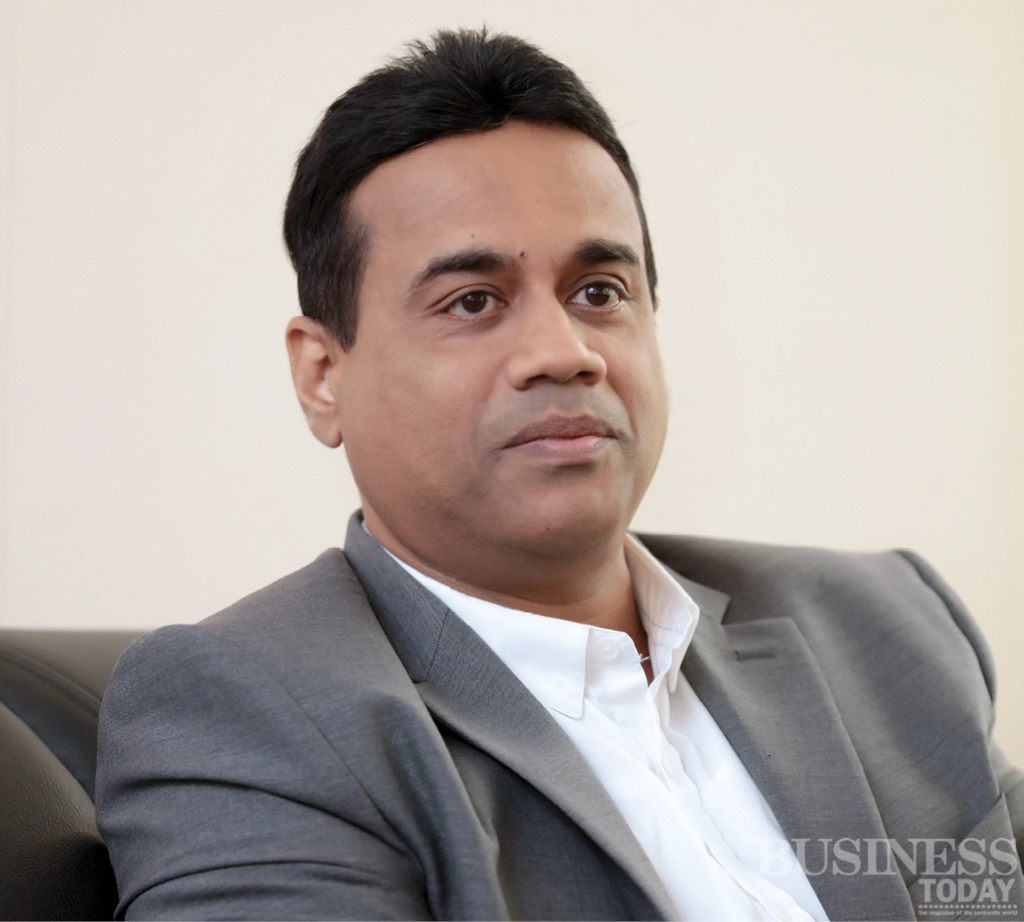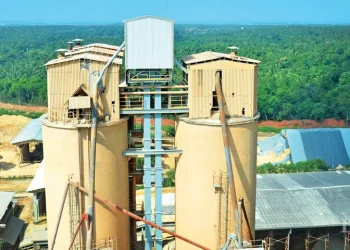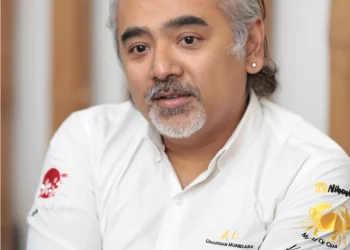
Kishu Gomes, former Managing Director/CEO, Chevron Lubricants Lanka has always been proud about providing opportunities for Sri Lankans and adding value to the country. He has single-handedly spearheaded the move towards the effective regulation of the country’s lubricants industry. He has been the industry’s biggest voice in ensuring the right message gets across to all stakeholders. Having headed Chevron Lubricants Lanka for 18 years, Kishu Gomes speaks about the company’s performance during his tenure at the helm of the only multinational where all staff were Sri Lankans. Citing the country’s potential, he shares his thoughts on the requirement for a stable operating environment as well as the need for Sri Lankans to be socially conscious.
By Udeshi Amarasinghe and Keshini De Silva
Photography Mahesh Bandara and Menaka Aravinda
Could you tell us about the performance of Chevron Lubricants Lanka during your tenure?
Chevron Lubricants Lanka progressed extremely well. It has been one of the most profitable companies in Sri Lanka. While not being the largest company in Sri Lanka or a company that makes the highest profits, if you consider ratios such as Return on Capital Profit, Assets Per Employee and Dividend Pay Out, it is one of the best companies in Sri Lanka.
I have been pleased about who we are, what the company stands for and what we had been able to deliver, especially in terms of the value creation offered to the country. The company continued to contribute around three billion rupees to Government income (to Government coffers). Though Chevron Lubricants is a multinational company, only Sri Lankans were employed while I was at the helm. Likewise, 49 per cent is a public shareholding (Chevron’s share is 51 per cent). Other multinationals in Sri Lanka do not have this type of public shareholding. It is an industry where a Sri Lanka company would not be able to succeed because of the requirement for global technology and raw materials. Therefore, foreign participation is required. Hence, Chevron Lubricants Lanka had foreign participation through investment as well as technology by Chevron and the other synergies received from being a Sri Lankan company. But the success is shared with a ratio of 51:49. Therefore, that model is best for Sri Lanka, given that we are struggling as a nation and as an economy we are trying to develop, gain economic independence and prosperity. The country is now talking about driving per capita income from 4,000 USD to 6,000 USD in the medium term. That is progress that I am very proud of.
Furthermore, being in a non-traditional export industry, the company’s ability to supply to foreign markets, and to countries that come under the listed entity in Sri Lanka – Bangladesh and the Maldives is notable. Chevron Lubricants Lanka sends to Pakistan a product called Havoline Eco a special application, which is blended in Sri Lanka. Products were also sent to Thailand as well, which is a common practice in Chevron. Toll blending, a terminology used in the petroleum industry, is where product are manufactured at Chevron for competitors. This was another opportunity that we capitalized on during my tenure.
If you consider the business model, that we adopted during my time as CEO, I cannot think of another multinational in Sri Lanka where many other Sri Lankan business partners have an active role to play in the business. For example, Hayleys Logiwis handled warehousing and distribution. Aitken Spence handled customs, exports and imports for the company. Phoenix, the number one plastic company in Sri Lanka manufactured plastic bottles/packaging, and their manufacturing facility is located within Chevron premises. This business model is one that many more companies should replicate in order to grow our economy. Foreign investments, which create value and then take a majority of that value out of the country does not really help the country unless there is a country friendly business model. That’s how I see it. Yes, foreign investment is a must and in a modern world although you could be the most patriotic, you must understand that foreign investment is required as we do not have enough capital to invest in required areas. We need them, but we need them on the right basis. That’s why I am proud of the business model implemented during my time at the helm.
Foreign Investment Is A Must And In A Modern World Although You Could Be The Most Patriotic, You Must Understand That Foreign Investment Is Required As We Do Not Have Enough Capital To Invest In The Required Areas.
Caltex returned to Sri Lanka in 1994 and the company has been in the country for 23 years. While being happy about the journey and the company has been able to grow in profitability, last year, the company took a profit hit. One reason was due to the increase in the cost of raw material. In 2017, raw material cost increased by 25 per cent when compared with 2016. As Sri Lanka does not manufacture petroleum, many raw materials needed to be imported and were paid for in US dollars. In terms of Forex, the Sri Lankan currency depreciation was 6.5 per cent, which had negative implications for us. Obviously, due to the bleak economic environment, the cost increase could not be passed to the market. As a result, profit in 2017 reduced. Another factor that resulted in this profit reduction was the prolonged drought in certain parts of the country and flash floods in other parts of the country. Sri Lanka being a small island had to face the worst droughts together with the worst floods during the same year. It can only happen in Sri Lanka. These natural disasters took away from the industry potential, but many other companies; consumer companies in particular were affected.
After the exit of Motul, a French company, there are 13 players (including Chevron) in the lubricant industry and only three manufacture locally. The other ten import finished goods, and toll blending is generally offered to them. With the exception of Ceypetco, all the others are private. Chevron Lubricants Lanka is listed on the stock exchange, while Laughs and Indian Oil are listed on the stock exchange as holding companies.
Having headed a multinational company what are the lessons and learnings for Sri Lanka?
Multinational companies are known for enhancing competitive advantages, which result from greater efficiency and productivity. It is something local companies lack in terms of best practices. This is why our Sri Lankan companies have not been able to take on the global challenge. We have made starts, and have been successful in certain areas, but should we be happy with the extent to which we have been able to conquer the global challenges? We have not been able to because Sri Lankan companies are struggling to maintain competitive advantages that are required to compete effectively in the local and international market. Multinational companies consider these and undergo constant changes to stay competitive. That needs to change, if the country hopes to become competitive as a nation and bring in foreign currency to the country.
It is sad that those who should make decisions, in the respect of creating the right environment for Sri Lankan businesses are making decisions to ensure that existing players have a different balance to share the same pie. We are not doing anything or at least are not doing anything big enough to expand the pie. The country becoming more competitive means, businesses becoming more competitive. It is the business that generates revenue for the country. These are the core areas that our stakeholders must understand.
What are the challenges in the industry?
The challenges are humongous. Obviously, competition has intensified in every single industry not just in the lubricants sector. The economy is not expanding to an extent where it can entertain more players. There is a form of fire fighting where shortsighted decisions are being made, which ultimately results in a fiercer business environment for everyone. Many companies in Sri Lanka, attempt to focus on the short term to stay afloat, which is very unhealthy considering the environment we live in. However, this is not limited to Sri Lanka. We need to pause and think in the medium to long term. For businesses to take that decision, the Government too must support the sector. It is not about providing incentives or reducing taxes, it is about creating an environment, which is predictable and stable. Where when you make a decision within the given regulatory or legal environment, you are able to make business decisions assuming that this will be the case for the next ten years. However, in Sri Lanka, if we talk about the past three to four years, taxes have been fluctuating. Hence, when an investor looks into feasibility and the rate of applying financial forecasting, it is impossible to use a number.
For instance, the Super Gain Tax was a disaster. Companies made profits, issued dividends to shareholders and then someone looking at a quick income levied a 25 per cent tax. How can a new investor trust a nation of that nature? For an investor, right or wrong, the most important thing is predictability. Investors may even choose to invest in a country, which is inherently bad, but there needs to be predictability. In Sri Lanka, the situation is such that the operating environment can be good today, bad tomorrow and something completely different the day after.
Competition is fierce. Locally, the biggest issue is the size of the market. There are 21.5 million people, 65,000 square kilometres and an economy that is not growing at the rate it should be growing; 7.5 per cent GDP growth is now down to four per cent growth. What is the expansion that you can think of going forward? The scope is limited and everyone will have to suffer. This is the biggest concern for established companies.
Of course, the devaluation of the currency has been a killer. We have seen the price of imports increasing and exports plummeting resulting in the further widening of the trade gap. Obviously, this predicament can lead to greater inflation. This will affect the spending power of consumers and it will be more challenging going forward.
Sri Lankans Need To Understand, The 8.5 Million Workforce Must Understand The Prevalent Situation And Do Something About It. We Need To Keep Expanding Our Horizons And Focus On The Modern Scale Of Acquisition Of Sharp Skills And On Growing Our Talent, To Ensure Our Workforce Is Competitive In The Global Sphere.
In a global context as well, there is concern. There are increased conflicts between countries and terrorism has reached a whole new level destroying so much value worldwide. The world is wasting nearly two trillion dollars annually to combat terrorism. Natural disasters occur more frequently and at a higher magnitude, negatively impacting the GDP growth of various countries. From China to Bangladesh, the natural disasters have been unprecedented. Even in Sri Lanka, we are constantly preparing for floods. For better or for worse, we are unable to quantify the damages caused by floods in Sri Lanka, therefore we do not ponder on the financials too much, despite knowing that the country is recording a significant loss. All these factors create greater competition, not just for businesses but also for us as human beings. The world population of 7.2 billion people will reach nine billion by 2040. It is a world where fuel among other resources are depleting despite the population growth. Already there is a major imbalance in the economy and in the current economic climate one can expect greater economic imbalance.
Sri Lankans need to understand, the 8.5 million workforce must understand the prevalent situation and do something about it. We need to keep expanding our horizons and focus on the modern scale of acquisition of sharp skills and on growing our talent, to ensure our workforce is competitive in the global sphere. Otherwise, we will never remove ourselves from this disastrous HR strategy, especially in terms of the importation of CEOs and other Executive Level employees, when in return our skill is being exported as housemaids, carpenters and plumbers. When unskilled labour is exported, it does not off-set the payment for the imported skilled labour. That is sadly the reality in the country. Stakeholders have not understood the gravity of this issue. Therefore, the status quo remains and the Government continues to sign Free Trade Agreements (FTAs), which will further aggravate the issue. If we are unable to address this imbalance, the country’s poor and dependent population will increase. We must all be socially conscious Sri Lankans.
Considering the size of the market in Sri Lanka, are there too many players?
The industry has a regulator – the Ministry and a shadow regulator – the Public Utilities Commission. The regulator has a conflict of interest as the Ministry is also invested in the lubricant business. On the other hand, the Public Utilities Commission sets product standards. There are individual certifications that companies must have in this industry, and it is the same across the world. Set specifications must be met. However, currently in Sri Lanka specifications are met by way of dominance. For example, customs will have a specification requesting certain papers that must be submitted as an importer stating the required specifications are met. Yet, there is no lab in Sri Lanka, where such items can be tested randomly to ensure imports to the country meet specifications. There is no independent laboratory, and Sri Lanka should make an investment in this regard.
In terms of the market size, this is a 65 million litre market shared by 13 players. On the other hand, India is a market of at least two billion litres and the Indian Oil Company says it has 27 serious players. Therefore, in terms of market opportunity, each player in India has roughly 74 million litres, while in Sri Lanka each player has around 4.9 million litres. Therefore, while there is intense competition, it is creating issues for the country and consumer. Because when companies cannot make profits, they will always try to cut corners. In this industry that can be a disaster. Because, in terms of food or clothing, you can almost immediately assess and understand the quality. But in terms of lubricants, one cannot assess the quality at face value, and moreover it will take time to feel the negative implications of an adulterated product. We have reported at least 30 adulterators with addresses, contact details and photographs of adulterated products. However, not a single place has been raided thus far. When consumers in the market assess a product, the channel partner will say this is genuine, and well the rest is history. You cannot experience the consequences immediately and after a period of time one cannot connect the issue with the adulterated oil either. Therefore, the regulation of this industry is important, especially as a country, we do not manufacture engines – our focus is mainly on the assembly of parts. Therefore, when an engine has problems then there is a drain in foreign currency, especially in a risky situation where the trade gap is widening.
I Have Never Had A Conflict With My Vision, Which Is To Ensure That The 21.5 Million Population Of Sri Lanka Have A Better Life.
The corporates make representations and attend meetings where good decisions are made. However, there is no action. The market needs to first be regulated before it is liberalised. I have been very vocal about the need for the stringent regulation of the industry. If you regulate and invite more players, then there is no harm, but if you don’t there will be adverse consequences and implications. It has almost been a single-handed endeavour.
As you start your new journey, looking back what are your thoughts?
Chevron Lubricants Lanka has survived in the country since 1994. I was in the company for 21 years, where for 18 years I headed the company as CEO. It was a challenge. Reaching the top is easy, but staying there is extremely tough. I did so for a significant period of time by delivering value to all stakeholders and I am pleased with my performance. We were always looking at creating more value for the country.
During my tenure, we were the only multinational in Sri Lanka to employ only Sri Lankans, and I hope that continues. Most of the time there are either companies merely headed by a Sri Lankan or companies where the top tier are expatriates. This was a change that came to be after my appointment as CEO. When I joined the company, the four top positions were occupied by expatriates. They left gradually, and by 2000, I was tipped to receive the position heading the operations in the country. Of course, as a global company there were foreign experts who would offer advice, consultations and share knowledge and know-how. Other than that, they were not on our payroll. I am very proud of implementing this model.
At this time, I would like to express my appreciation to Business Today for the service rendered to the nation through the Business Today TOP corporate awards. It is not only in terms of recognising corporates, but also in providing a platform where we can come together and disseminate messages to the right stakeholders. It is a one of a kind event. My sincere gratitude to Business Today.
I have never had a conflict with my vision, which is to ensure that the 21.5 million population of Sri Lanka have a better life. To ensure they have access to three meals a day and have access to basic needs and wants. That is the end game, and my personal vision. Anything that I do and exert my efforts on is directed towards that. All I do as a businessman and all that I am, everything is in line with this vision. Should we be happy that that the statistics indicate that our per capita income is 4,000 USD and that we are categorised as a middle income country? We need to look beyond the numbers.





